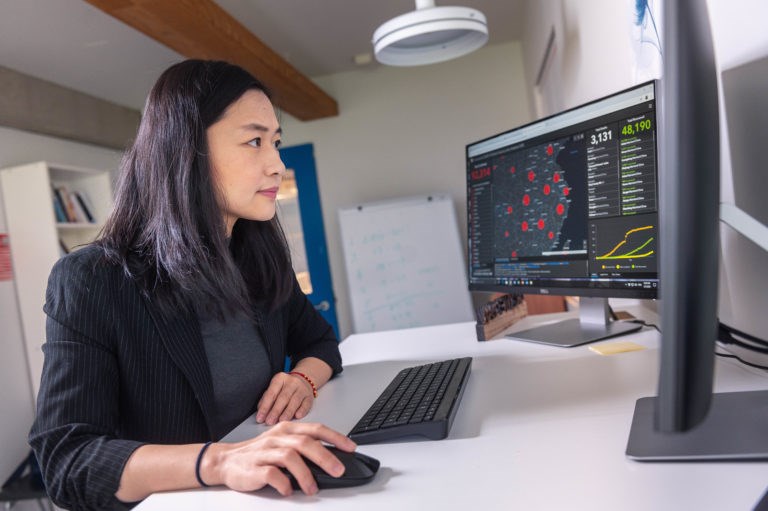Researchers and health sciences experts from the University of B.C. and Simon Fraser University are helping with the response to the novel coronavirus outbreak, thanks to some federal funding.
UBC announced March 6 it received more than $2.8 million in federal grants to study COVID-19, with a focus on the development, testing and implementation of measures to deal with the spread of the virus.
And the work is a little more personal for one researcher. Sociologist Yue Qian is originally from Wuhan, China — the epicentre of the outbreak that has so far killed more than 4,000 people and infected more than 110,000 globally.
“When the quarantine was first issued, I was so worried,” Qian said in a press release. “I was desperately trying to connect with my family in Wuhan to make sure they were OK. Watching from afar has been really hard.”
Qian, an assistant professor in the UBC department of sociology, said that none of her family members have been infected, but some friends’ families have been less fortunate, with many being hospitalized and some dying from COVID-19.
Qian and her team, which includes sociologist Amy Hanser, will receive $400,468 for a study of the human experiences and mental health consequences of quarantine.
“Getting this funding means a lot to me because I get to conduct research that I care deeply about,” Qian said. “I feel that this is the least I can do to help people in my hometown who are suffering a lot right now.”
And while the team is still in the process of setting up the study, Qian said she’s already noticed a common theme during conversations with family and friends in Wuhan.
“I’ve learned that people are incredibly resilient and that everyone has their own way of coping when they are faced with a difficult situation,” she said. “It’s important for us as social scientists to be able to understand their experiences.”
There’s an app for that
Another team, led by Dr. Richard Lester, an associate professor in global health at UBC, is looking into the potential for a mobile virtual health care app, called WelTel, to help people who are self-isolating to prevent transmission of COVID-19.
Lester and his team received $500,000 from the Canadian Institutes of Health Research to deploy the app, which has already seen success in Kenya helping HIV patients adhere to antiretroviral therapy and prevent the spread of HIV.
“Now we have an opportunity to show how WelTel can help stop the spread of COVID-19 through supporting patients who are self-isolating at home,” he said.
Guidelines for infected patients
Dr. Srinivas Murthy, a clinical professor in the department of pediatrics and a pediatrician at B.C. Children’s Hospital, is leading a national study of hospitalized patients with confirmed COVID-19.
His team got more than $950,000 to research how best to treat the disease. The team is also working to develop formal treatment guidelines for the World Health Organization.
“It may sound rudimentary, but we still do not know who gets sick and why an individual may become sicker,” Murthy said. “It’s important to gain a deeper understanding of COVID-19 in order to help infected Canadians and people around the world.”
Looking for answers
A team of researchers from UBC, SFU and the B.C. Centre for Disease Control, got $1 million, in addition to $150,000 they received last month from Genome B.C., to try to answer the many unknowns about COVID-19.
“There are many unanswered questions about COVID-19,” said Natalie Prystajecky, a clinical assistant professor in UBC’s department of pathology and laboratory medicine, who is one of the team’s co-leaders. “For us, being on the frontlines of the response, it is incredibly important to try to fill in some of these knowledge gaps.”
Coordinated response
SFU health sciences professor Kelley Lee is leading a project that will help with coordinating the global response to the outbreak.
Lee and her team received $500,000 in funding from CIHR to help define, categorize and track cross-border measures adopted by countries and private companies during the COVID-19 outbreak, as well as previous outbreaks.
The team, based in Vancouver, Hong Kong, Sydney and Washington, D.C., will compare this data with measures adopted during other public health emergencies to assess their effectiveness. The team will work closely with the World Health Organization and other public health organizations, to collect and analyze new data and combine it with existing information, to help governments and companies make better decisions during outbreaks like COVID-19.
“We know that governments and companies are under tremendous pressure to act quickly and effectively during a fast moving event such as COVID-19,” Lee said in a press release. “We want to better understand what certain cross-border measures are being adopted, why they are being adopted and whether they are actually effective.
“We can use that knowledge to create a decision tool that will support more evidence-informed decision making.”



